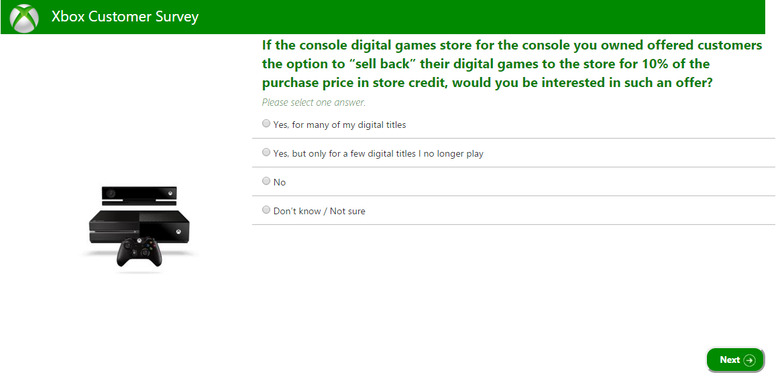Microsoft Asks If Xbox Gamers OK With Selling Back Titles
Before digital copies of video games proliferated, there was a sub-market that thrived in selling second hand, or "slightly used", cartridges and discs for a fraction of the original price. GameStop is just the latest and most legit incarnation, but selling a game you're already done with, or didn't like, wasn't that alien a concept back then. And then Steam and its ilk happened. Doing the same with digital copies has been next to impractical but based on a survey for Xbox gamers, Microsoft might be interested in it.
Or at least Microsoft wants to know if gamers are actually interesting in a sell back program. According to the leaked survey, Xbox gamers are being polled whether they're willing to sell a title back to Microsoft in exchange for 10% of the game's purchase price as in-store credit. That means a game bought for $50 will be sold for $5 worth of Xbox Store credits.

Compared to rates offered by GameStop, that's almost negligible. But GameStop deals with physical media. Try doing that with a downloadable, digital version, which is usually cheaper in the first place.
Of course, it's just a survey and Microsoft might just be curious about what its gamers think rather than hints at a solid plan. It does, however, give the impression of a shift in the gaming market. Once just a niche, digital game distributions like Steam on the PC and the Xbox and PlayStation's respective stores have become the go to stores for gamers, at least the non-collectors. The market for that might have grown big enough to warrant a "second hand" sub-market here as well.
Of course, the big question would be why. Buying and selling used discs and cartridges makes sense, whether to reduce clutter or to help offset lack in supply, especially with older titles that have gone out of print. But since there is barely any cost involved in distributing a digital copy of the game and that, in theory, supply lasts as long as developer and publisher have it available for download, there is perhaps less business incentive for such a program.
VIA: Gamespot
